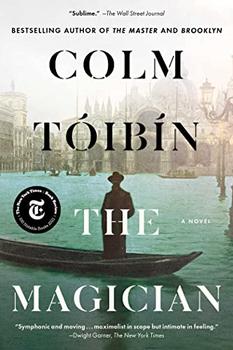Summary | Excerpt | Reading Guide | Reviews | Beyond the Book | Readalikes | Genres & Themes | Author Bio

A Novel
by Colm Toibin
When Elisabeth came to visit the next time, she was not invited to sit down.
"Did you know about my husband's will?" Julia asked her.
"I was not consulted," Elisabeth replied.
"That was not the question. Did you know about it?"
"Julia, not in front of the children!"
"There is something I have always wanted to say," Julia said, "and I can say it now that I am free. And I will say it in front of the children. I have never liked you. And it's a pity your mother is no longer alive, because I would say the same to her."
Heinrich made to stop her but Julia brushed him aside.
"The senator made that will to humiliate me."
"You could hardly have run the business yourself," Elisabeth said.
"I could have decided. My sons and I could have decided."
For the citizens of Lübeck, for those whom Julia had teased or spoken of lightly at parties in her husband's house, men such as Herr Kellinghusen or Herr Cadovius, women such as young Frau Stavenhitter or Frau Mackenthun, or for women who watched her carefully and deplored what they saw, such as Frau Overbeck and her daughter, Julia's decision, made public soon after the reading of the will, to move to Munich with her three youngest children and set up home there, leaving Thomas behind to complete his final year at school while boarding in the house of Dr. Timpe, and encouraging Heinrich to travel to improve his chances in the literary world, could not have been more perverse.
If the widow of Senator Mann had decided to move to Lüneburg or Hamburg, the good people of Lübeck might have seen this as a mere aspect of her unreliability, but in those years, Thomas knew, for these Hanseatic burghers, Munich represented the south, and they disliked the south and did not trust it. The city was Catholic; it was bohemian. It had no solid virtues. None of them had ever been there for longer than was necessary.
Lübeck's attention was on his mother, especially when Aunt Elisabeth told people in confidence how rude Julia had been to her and how she had sullied the memory of her mother.
For a while, in their world, the talk was of nothing except the lack of placidity displayed by the senator's widow and her unwise plans. It struck no one, not even Heinrich, how wounded Thomas was that the family firm had not been left to him, even if it were to be supervised by others until he came of age.
Thomas lived with the shock of the knowledge that he was destined to have taken away from him what he had believed, in some of his dreams, would be his. He knew that running the family business was merely one of the many ways he had imagined his future, but he felt anger at his father for the presumption in his decision. He disliked the idea that his father had seen through his illusions without realizing how real they often appeared to him. He wished he had had the opportunity to give his father evidence enough to have left a more generous will.
Instead, his father had cut the family adrift. Since the senator could not live, he had set about vitiating the lives of others. Thomas felt a persistent and gnawing sorrow that all the effort of the Manns in Lübeck would come to nothing now. The time of his family was over.
No matter where they went in the world, the Manns of Lübeck would never be known as they had been known when the senator was alive. This did not seem to bother Heinrich or his sisters, or indeed his mother; they had other, more practical concerns. He knew that his aunt Elisabeth felt that the status of the family had been fatally undermined, but he could hardly discuss this with her. Instead, he was alone with these thoughts. The family would now be uprooted from Lübeck. No matter where he went, he would never be important again.
Excerpted from The Magician by Colm Toibin. Copyright © 2021 by Colm Toibin. Excerpted by permission of Scribner. All rights reserved. No part of this excerpt may be reproduced or reprinted without permission in writing from the publisher.
Your guide toexceptional books
BookBrowse seeks out and recommends the best in contemporary fiction and nonfiction—books that not only engage and entertain but also deepen our understanding of ourselves and the world around us.